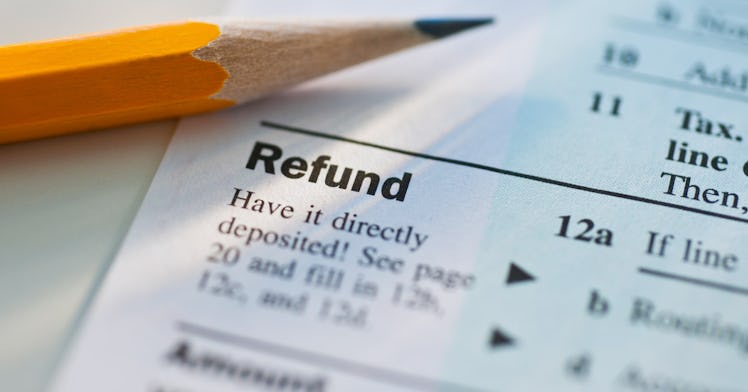Middle Class People Could Owe Nothing in Federal Income Tax This Year
Income taxes will plummet this year for low and middle income people, all due to the stimulus package.

An undersold aspect of the temporary tax cuts (given to Americans largely in the form of stimulus checks, expanded tax credits, and more) included in President Biden’s $1.9 trillion stimulus package he passed in March of 2021 is just how much those cuts are driving down tax rates on low and middle-class people.
In fact, per Politico, those cuts are so dramatic that on average, people earning less than $75,000 will, on average, owe nothing in federal income taxes — and those making between that and $100,000 will pay a 1.8 percent average tax rate this year.
The move, which also shifts the burden of taxes onto high earners, is a massive help to American families who are struggling to make ends meet and can’t handle a surprise massive tax bill. Here’s what to know about your taxes — and how lucky you’ll probably get if you’re middle or low income.
What The Tax Cuts Are, Explained
The temporary tax cuts, which were approved in the COVID-19 American Rescue Plan spending package from March, have largely already come to hit American’s pockets well before tax time.
Stimulus checks, dependent care expenses tax breaks, and the child tax credit, as well as the expansion of the Earned Income Tax Credit, all operate as tax cuts for taxpayers, which were limited to certain incomes and tapered off for high earners.
People earning between $30,000 and $40,000 will owe nothing in federal income taxes this year, per the Joint Committee on Taxation. As previously stated, on average, people earning less than $75,000 will likely pay zero in federal income taxes this year, while those earning between that amount and $100,000 will pay less than a 2 percent tax rate.
Those making more than $500,000 per year will take on two-thirds of this year’s federal income tax level, but they won’t see their average tax burdens rise that much, either.
Here’s How They Could Be Permanent
While the payments, which are technically tax cuts, are only temporary as a result of the pandemic, Democrats are pushing to make much of the changes — like the expansion of the Child Tax Credit into fully refundable, periodic payments to parents of children to the tune of hundreds of dollars a month per child — permanent.
This could mean that over the next several years, low and middle-income families win big on receiving direct aid from the tax system and from the government in a way that has never been done before, while wealthier people pay a fairer share of their taxes.
That’s because President Biden also wants to raise taxes for high earners by raising the marginal income tax rate and capital gains taxes as well as raising the corporate tax rate. That means that those wealthy earners could contribute more to the rest of us, and the way the tax system is structured could be permanently changed — for the better.
This article was originally published on